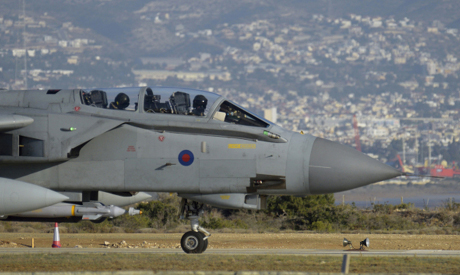
A British tornado warplane passes on the runway at the RAF Akrotiri, a British air base near costal city of Limassol, Cyprus after an airstrike Thursday, Dec. 3, 2015 (Photo: AP)
Britain joined the US-led bombing campaign over Syria on Thursday, hitting an oil field held by ISIS just hours after a decisive parliamentary vote authorised air strikes.
Royal Air Force planes based in Cyprus carried out the "first offensive operation over Syria and have conducted strikes", a defence ministry spokesman said Thursday, following a vote Wednesday evening.
The strikes, carried out by four Tornado fighters, focused on six targets in the oil field in eastern Syria, 30 miles (48 kilometres) from the Syria border, the ministry said.
The first two jets took off around 2330 GMT followed by two more an hour later, each carrying three precision-guided 500lb (226kg) Paveway bombs and returning without them, the BBC reported.
"This strikes a very real blow at the oil and the revenue on which the Daesh terrorists depend," Defence Secretary Michael Fallon told the BBC, using an alternative name for ISIS.
Prime Minister David Cameron's government was backed by 397 lawmakers compared to 223 who opposed the bombing, giving him the strong mandate he said was essential for military action.
Cameron welcomed the result of the House of Commons vote, writing on Twitter: "I believe the house has taken the right decision to keep the UK safe -- military action in Syria as one part of a broader strategy."
It was also immediately hailed by US President Barack Obama, who said the US would "look forward to having British forces flying with the coalition over Syria".
Momentum to join the strikes grew after last month's terror attack on Paris that claimed 130 lives.
French President Francois Hollande on Thursday welcomed the "new response to the call for European solidarity".
During the 10-hour parliamentary debate, a wide range of MPs from all parties including main opposition Labour leader Jeremy Corbyn spoke out against air strikes.
Corbyn condemned Cameron's "ill thought-out rush to war" and said his proposals "simply do not stack up".
However, Labour was also deeply split on the issue. Some 67 of its 231 MPs reportedly voted in favour of bombing, including 11 members of Corbyn's frontbench.
"Tornados at dawn" was the front-page headline on Britain's top-selling paper, The Sun, while The Times ran with: "PM wins huge backing for war".
Britain already has eight Tornado fighter jets plus drones involved in the US-led coalition striking ISIS targets in Iraq, operating out of RAF Akrotiri in Cyprus.
They will be joined by six Typhoon jets, which took off from RAF Lossiemouth in Scotland shortly after 0800 GMT, and two more Tornado fighters, which were due to take off from RAF Marham in southeast England.
But experts question how much Britain, which has been wary of joining foreign conflicts in recent years after unpopular wars in Afghanistan and Iraq, would add to the campaign against ISIS in Syria.
"It will not make a big operational difference," said Professor Malcolm Chalmers of military think-tank the Royal United Services Institute (RUSI).
"It is important symbolically, useful operationally, but not transformative."
Tim Eaton and Chris Phillips of foreign affairs think-tank Chatham House accused ministers of "knee-jerk reactions... not part of a well-considered long-term strategy to defeat and degrade IS".
Cameron has pledged that Britain joining air strikes on Syria will be matched by a major diplomatic push to resolve the crisis.
The last Syria peace talks in Vienna held last month brought together 17 countries including Russia, the United States, Saudi Arabia and Iran.
It set a fixed calendar for a ceasefire followed by a transitional government in six months and elections one year later. Syrian opposition figures have called this unrealistic.
During the debate, the government also faced a string of questions about whether joining the international military action on Syria could make Britain more vulnerable to attacks from IS.
The last major attack on British soil was the July 7, 2005 bombings in which 52 people died.
And in June this year, 30 Britons were among 38 tourists killed in an attack at a holiday resort in Tunisia claimed by ISIS.
Officials say seven plots have been foiled by intelligence services in the last year alone.
Cameron said this figure showed it was right to take immediate action.
"These terrorists are plotting to kill us and radicalise our children right now," he said. "They attack us because of who we are, not because of what we do".
Short link: